Season 6: Episode #150
Podcast with David H. Berger, MD, Digital Health Entrepreneur, Founder, AI Healthcare Insights
Share
In this episode, David H. Berger, MD discusses his journey from being an academic surgeon and oncologist to a leadership role in healthcare management. He also discusses his mission to simplify healthcare by making it more accessible and effective for everyone.
David emphasizes on the potential of digital tools and technologies in improving care delivery. He highlights real-world applications, such as managing operating rooms, reducing sepsis-related mortality by nearly 50%, and leveraging machine learning algorithms to predict patient readmissions.
David also talks about how AI, generative AI, scribes, ambient listening, ambient dictation, augmented reality and virtual reality are reshaping the landscape of health systems. David compares the varying adoption rates of technologies like ambient listening and dictation among surgeons and primary care physicians, and underscores the importance of embracing these innovations to maximize their value in improving care delivery. Take a listen.
Show Notes |
||||
| 01:14 | What interests you in the healthcare industry segment to become the CIO of a hospital system? | |||
| 02:47 | How long have you been in the leadership position at UMC, where is it located, and what kind of population does it serve? | |||
| 03:35 | You have done a lot of work from technology perspective to support the business needs of the hospital. You've done over 200 applications and transformed the EMR system. Would you like to share with the audience the thought process that drove those changes and what were some of those changes? | |||
| 07:47 | What do you think about your digital transformation efforts? If you could describe a few of them which have had impact on the patient population. | |||
| 08:30 | Please describe in your own, you know, way that what is digital transformation for provider systems such as yours? Where do you see it going? Some of the challenges that you might have faced and how did it actually end up impacting patients? | |||
| 11:24 | How did you manage to change the mindset of the people? How did they manage to change themselves? To adapt to this new world where technology, especially with AI and GenAI and other new technologies which are coming our way, how do you change mindsets and change behaviors and change culture over there? | |||
| 13:00 | Would you like to provide one example of how the technologies which you were implementing, and you continue to be implementing in your hospital system are accessible and usable by a variety of users, including within the hospital and outside the hospital. | |||
| 16:28 | How do you innovate? Do you involve external parties? Do you have some kind of a, you know, innovation focus department? Or is it part and parcel of everybody's, you know, kind of like daily life? | |||
| 19:24 | What are your thoughts on new technologies, especially Gen AI? Have you been experimenting with any predictive analytics or large language models? What would be your advice or thoughts to any other healthcare leaders on how to go about this journey of exploration? | |||
| 22:15 | Standing here now and looking back, if you were able to go back and change one or two things, what would you like to do differently or have done differently? | |||
Video Podcast and Extracts
About Our Guest
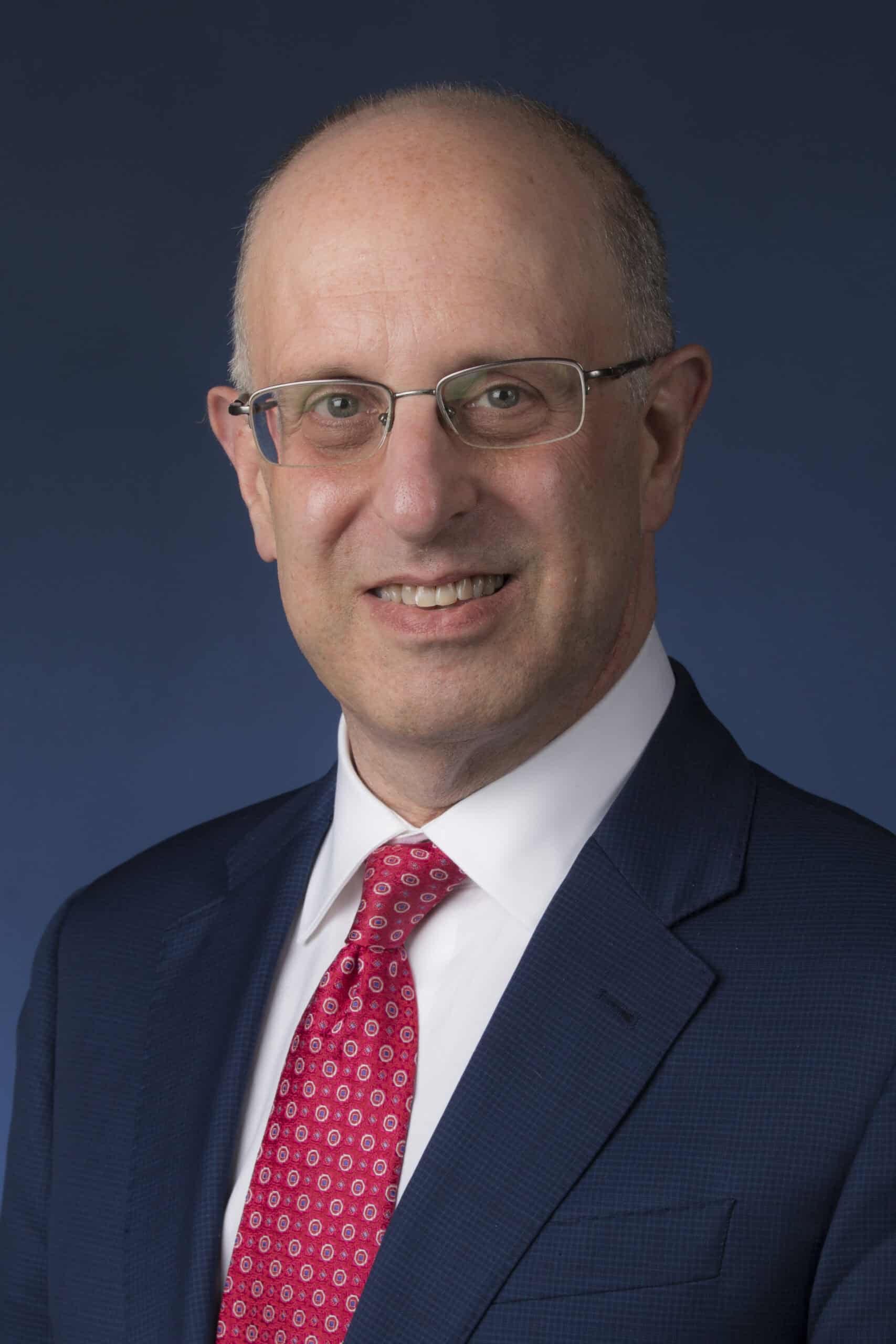
David H. Berger, MD, MHCM is a digital health entrepreneur serving on the advisory boards of several digital healthcare startups. Dr. Berger has experience identifying cutting edge health care technology and implementing the technology effectively in hospitals. He is on the board of the Breakthrough Alliance, the oversight board for the HIT Lab at Columbia University. Dr. Berger serves as a mentor for early-stage companies as part of NYU Tandon Future Labs A/X Venture Studio, Techstars and Ignite Health. He is a frequent speaker at digital health conferences.
Dr. Berger has extensive experience in healthcare leadership and operations having served as the Chief Executive Officer of University Hospital at Downstate and as the Senior Vice President and Chief Operating Officer of Baylor St. Luke’s Medical Center in Houston.
Dr. Berger is a native of New York, where he received his medical degree from the State University of New York Health Science Center at Brooklyn. Dr. Berger completed a General Surgery residency at SUNY-Brooklyn and fellowship in Surgical Oncology at the UT MD Anderson Cancer Center. Dr. Berger completed a Master of Science in Health Care Management at Harvard University in 2007. Dr. Berger has over 200 publications. He has been a tenured professor of Surgery at two medical schools. He is a member of the medical honor society Alpha Omega Alpha.
Recent Episodes
Q: David, welcome to the 150th episode of The Big Unlock Podcast. Padmanabhan had done a lot of the previous episodes of this podcast and I’m carrying on his legacy.
So, David, would you take a few minutes and like to introduce yourself to the audience and talk about yourself and the health system as well where you have been working?
David: Yeah, sure. Thanks a lot for hosting me. It’s an honor to be here with you this afternoon.
I’m David Berger. I started out as an academic surgeon and surgical oncologist. I did my general surgery training at SUNY Downstate and a fellowship in surgical oncology at MD Anderson Cancer Center in Houston, Texas. I initially thought I would become an academic surgeon—maybe a surgical oncology division chief, chair of surgery, or even a dean someday—but my career trajectory shifted due to unique opportunities.
Early in my career, I undertook a management role as the Chief of the Operative Care Line at the Houston VA, the Michael E. DeBakey Medical Center. It’s the largest, most complex, and busiest VA medical system in the country. Around that time, as part of the sandwich generation, I was also taking care of both my children and my parents. I realized how difficult it was to navigate the healthcare system. If it was challenging for me—someone who knows the system and has contacts—I couldn’t imagine how hard it must be for those without the same resources.
This experience shaped my career goal: to make healthcare simpler. The healthcare system is extremely complex, and I saw the potential of digital tools to transform care delivery, making it more accessible and effective. While at the VA, I implemented sophisticated digital health tools. One notable project involved real-time location systems (RTLS) for managing our operating rooms. We reduced turnover time between cases by nearly 50% and achieved a 95% on-time first case start rate—remarkable for any healthcare system, not just the VA.
Building on this success, I moved to the private sector as Chief Operating Officer at Baylor St. Luke’s Medical Center. There, we implemented machine learning tools to predict which patients were at risk of sepsis-related decompensation. By intervening early, we reduced sepsis mortality by almost 50%. This was back in 2014, well before the recent wave of AI publicity, but it reinforced my belief that digital health, AI, and machine learning are poised to revolutionize healthcare.
After Baylor St. Luke’s, I returned to SUNY Downstate, where I had completed my training, to serve as the Chief Executive Officer of University Hospital at Downstate. I started in September 2020 and recently left to focus on my passion: digital health and artificial intelligence in healthcare.
Now, I advise early-stage startups, participate in advisory boards and venture studios, and am about to become an LP in early-stage venture funds supporting digital health companies. That’s a little about me and my journey.
Q: That’s really great to know, David. It’s fantastic that physicians like yourself are taking on this journey because your deep domain knowledge can drive meaningful change in digital health.
I also learned that you’ve been an entrepreneur. Could you share a bit about your entrepreneurial journey and the kinds of software or digital solutions you worked with?
David: So, about 10–12 years ago, I was approached by an early-stage startup company based in Canada. They had come across an article we published on early warning signs for readmission after colon cancer surgery.
We had identified at least 10 early warning signs and developed a machine learning algorithm to predict who was at risk of being readmitted. This software company wanted to integrate our findings into their tool. We conducted a couple of successful pilots and started discussing a long-term relationship. The idea was that we, as clinicians and researchers, would provide the intellectual property to power their software.
But we thought they were undervaluing what we were bringing to the table. So we actually went to Baylor College of Medicine, and they spun us off as a company, as our own company, from Baylor Technologies.
I learned a lot from trying to start my first company. Not all the learnings were good, but they were important.
What I learned is, one, if you’re going to start a startup, you have to devote all your time to it. You can’t do it on the side. I was heavily involved as a clinician and an administrator, and I was trying to do this on the side.
Second, you must have alignment of your board. We had five board members—me, two from Baylor, and two from the company that was helping us on the IT side. Well, the people on the IT side and the people at Baylor College of Medicine were diametrically opposed on the direction, and we got stuck and couldn’t move forward.
So after about running through a million bucks, the company died. But what’s interesting is that there are a couple of startups just getting going with the same idea we proposed and were trying to move forward 10 years ago.
So, the idea was the right one, but the alignment was poor, and I wasn’t committing full-time to it. Those are really important lessons for anyone trying to start.
Q: Great lessons learned there. Yeah. And then, David, you were talking about how AI is, you know, going to be changing the landscape, and you have a certain way of looking at it, especially for healthcare systems. So we’d love to learn your thoughts about that—about AI, GenAI, and where you think it is going, and how one should, you know, kind of embrace it and adopt it to get more value.
David: So I am extremely excited about the potential for artificial intelligence to help us provide healthcare because there are so many repetitive processes in healthcare that are being done by people that probably can be done by technology.
When I think about a health system—and, you know, I was running a hospital—about the different places where artificial intelligence could have a major impact, I break it down really into four different areas. This is general; there’s overlap.
So the first one is obviously back-office functions—things like revenue cycle, coding, billing, documentation, pre-authorization. All those things that have to do with revenue cycle.
Then I look at the front end or access—giving patients the opportunity to interact with a provider, giving them the opportunity to schedule, how they’re going to pay for their healthcare, et cetera.
And then on the care delivery side, there are things that help make care easier to deliver, and then there are things that actually help provide care.
So let’s break down those two things. When I say make it easier to deliver care, I’m talking about things like artificial intelligence scribes or ambient listening, ambient dictation.
When I talk about things that help actually deliver care, I’m looking at adjuncts to help read X-rays. So one use case that’s fairly well-developed is the issue around mammography. An important fact and something that radiologists look at in mammograms is breast density.
Breast density sometimes predicts further cancer down the road. Radiologists are really bad at quantitating breast density, and there’s a total lack of correlation from one radiologist to another. But using artificial intelligence, you can improve the ability to determine breast density to almost 95 percent accuracy.
So that is a place where artificial intelligence could augment care and improve how care is delivered and the diagnostic accuracy. That’s what I mean when I say help facilitate care versus actually help deliver care.
Q: Understood. And David, in particular, just for a moment to segue into all the new generative AI technologies that are coming our way. It’s not just about text; it’s also about so many different forms of care and media that it can transform. So any thoughts on where you think generative AI might play a larger role or be more conducive in the healthcare setting?
David: Yeah, so in terms of generative AI, one of the solutions we implemented is something called AVO. And what AVO does is ambient listening—it helps physicians to write the note. But that’s just part of it; that’s not really the full generative AI component.
What it then does is pull relevant information from the electronic medical record to create a real functioning note. It puts in front of the clinician a differential diagnosis, as well as the clinical pathways related to that diagnosis. So yes, it’s ambient listening, which is important, but it’s also natural language processing. It helps to generate feedback, a differential diagnosis, and then the proper treatment pathway for that patient.
It also presents the note in a way that facilitates coding, billing, etc., for the hospital or system to get reimbursed. That has been a game changer for our patients.
Thinking about implementation, though, the implementation of any new tool is really, really challenging. What we found with the ambient listening and ambient dictation is that there was a different level of adoption between specialists like surgeons and primary care doctors. Why do you think that is? I’ll throw it back at you.
Q: I couldn’t even guess that. First of all, I’m thinking to myself, is it the primary care physicians who adopt it more, or is it the—yeah?
David: It’s the specialists and the surgeons who adopt it more readily. For them, a note is something they have to do; it’s not really what they want to do. They want to focus on their operation, their procedure, etc. So, for them, the note is more of a barrier to doing what they really want to do.
For a primary care doctor, one of their primary goals is to create a detailed note. So, for them, the nuances around creating the note are really important. Whereas for a surgeon, they don’t care as much if it’s perfect—they just want to get it done. So, the adoption was much quicker with surgeons than with primary care physicians.
We also implemented it in the emergency room, which is a tight space with a lot going on. Some of the ambient listening got distracted because of other noises in the environment. We had to figure out ways to ensure that, during the interaction between the clinician and the patient, there was as little ambient noise as possible. But we worked through that, and the adoption was incredible.
People have talked about AI replacing physicians. Five years ago, someone came out and said that within five years, there wouldn’t be any need for radiologists. Well, clearly, that hasn’t happened. But I see AI being used as an adjunct to clinicians—helping them to be better at what they do, not just in terms of efficiency, but also in improving accuracy in care and diagnoses.
I think clinicians are going to become partners with artificial intelligence. Another area where I think AI, generative AI, augmented reality, and virtual reality are going to have a huge role is in education.
Even in teaching within the operating room. Right now, the way you teach in the operating room is by working with a resident across from you. Over time, you give them more and more experience and freedom to conduct the procedure. But think about this: if you have really good augmented reality, you could have them work with a headset in an environment outside of the operating room to hone their skills in a space where there’s no risk to patients.
So, there are amazing opportunities for augmented reality and virtual reality, not just in education, but also in surgery. For instance, I used to do a lot of liver surgery. The liver is a three-dimensional structure, but the inputs—like where the vessels are or where the tumor is—come from 2D images. These are from CT scans, MRIs, or ultrasounds.
Then, once you’re in the operating room, you’re trying to reconstruct that 2D image in your mind into a 3D picture, relating it to the organ in front of you. It’s challenging, but you get better at it with experience. Now, with augmented reality, you can actually see, right in front of you, where the tumor is in relation to other structures within the organ.
This has been really well-developed in neurosurgery, but it’s an exciting opportunity for AI, virtual reality, and augmented reality in other types of surgery as well.
Q: Yeah, great example, David. So, my last question is about your new venture or the new role you’re going to be taking on soon, as you described earlier in the podcast. Which aspect are you more excited about? Because you’ve seen the startup side of things, and now you’ve been in a large health system. Where do you think you’ll be spending more of your time and adding value?
David: So, I think healthcare is slow to change from the inside. A number of the bigger systems have developed innovation labs and are trying to move the field forward, but I think a lot of the change is going to come from outside—from companies outside of healthcare.
What I’ve decided to do is move away from running a healthcare system or hospital to being more involved in the digital health and AI ecosystems. I think the way I can best contribute is as an advisor to early-stage companies within this space, but also as an advisor to investors and venture companies looking at which technologies are actually going to make a difference.
Since I have the perspective of both a clinician and an operator within the health system, I think I bring a unique lens to identifying which digital health solutions are really going to make an impact.
Q: Awesome opportunity, David. I’m wishing you all the best in this role? And then would you have any other closing thoughts for our audience?
David: I think we are at an inflection point, between technology and the desperate needs within the health system. The costs have risen dramatically, people do not have adequate access and there are huge problems within our health system. I think we have opportunity right now to make a difference.
To move healthcare forward and to improve the healthcare system within this country, I encourage people who are thinking about careers within healthcare to think about the innovation side and the digital health side, because that is really going to have a huge effect and move the needle.
We hope you enjoyed this podcast. Subscribe to our podcast series at www.thebigunlock.com and write to us at [email protected]
Disclaimer: This Q&A has been derived from the podcast transcript and has been edited for readability and clarity.
About the host
Paddy is the co-author of Healthcare Digital Transformation – How Consumerism, Technology and Pandemic are Accelerating the Future (Taylor & Francis, Aug 2020), along with Edward W. Marx. Paddy is also the author of the best-selling book The Big Unlock – Harnessing Data and Growing Digital Health Businesses in a Value-based Care Era (Archway Publishing, 2017). He is the host of the highly subscribed The Big Unlock podcast on digital transformation in healthcare featuring C-level executives from the healthcare and technology sectors. He is widely published and has a by-lined column in CIO Magazine and other respected industry publications.
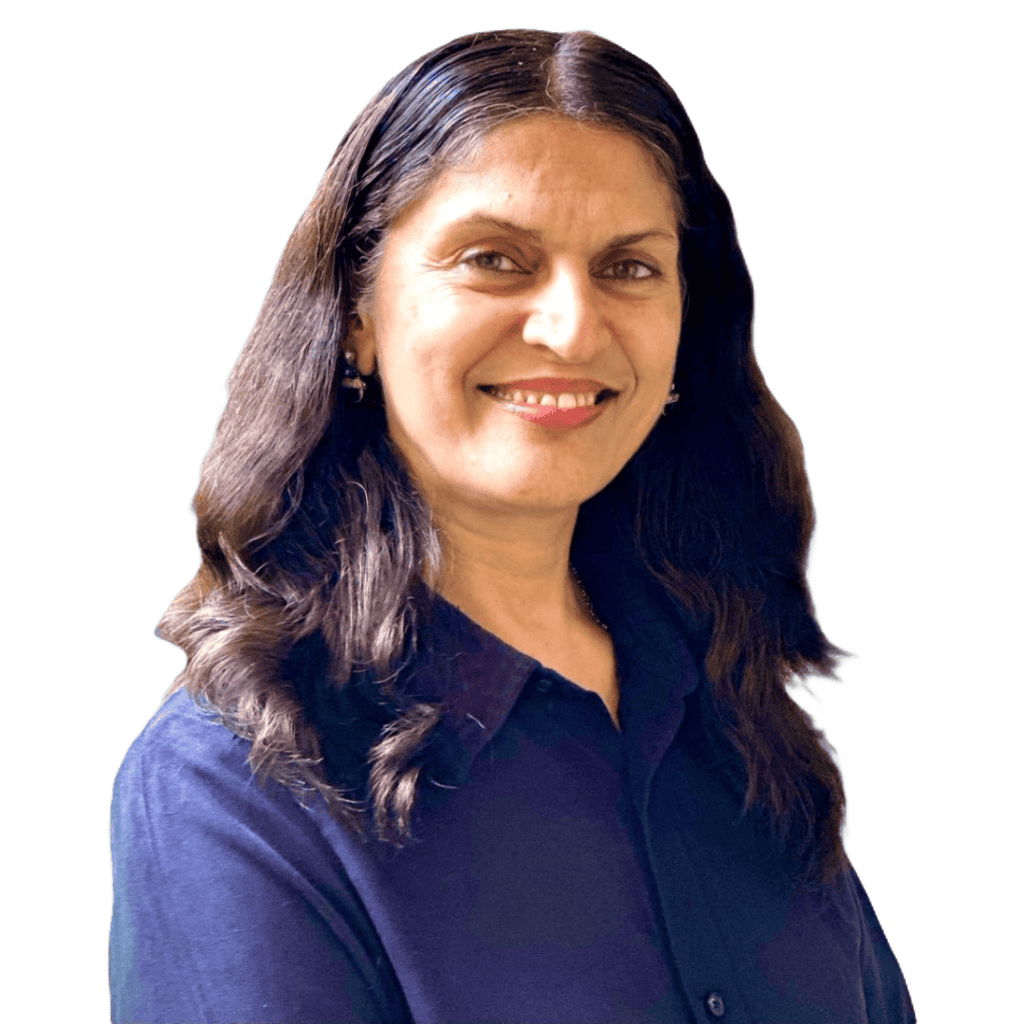
Ritu M. Uberoy has over twenty-five years of experience in the software and information technology industry in the United States and in India. She established Saviance Technologies in India and has been involved in the delivery of several successful software projects and products to clients in various industry segments.
Ritu completed AI for Health Care: Concepts and Applications from the Harvard T.H. Chan School of Public Health and Applied Generative AI for Digital Transformation from MIT Professional Education. She has successfully taught Gen AI concepts in a classroom setting in Houston and in workshop settings to C-Suite leaders in Boston and Cleveland. She attended HIMSS in March 2024 at Orlando and the Imagination in Action AI Summit at MIT in April 2024. She is also responsible for the GenAI Center of Excellence at BigRio and DigiMTM Digital Maturity Model and Assessment at Damo.
Ritu earned her Bachelor’s degree in Computer Science from Delhi Institute of Technology (now NSIT) and a Master’s degree in Computer Science from Santa Clara University in California. She has participated in the Fellow’s program at The Wharton School, University of Pennsylvania.
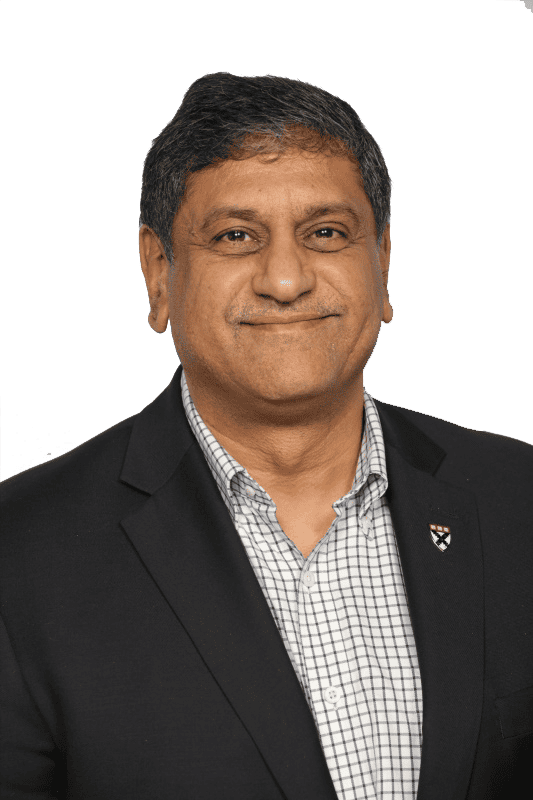
Rohit Mahajan is an entrepreneur and a leader in the information technology and software industry. His focus lies in the field of artificial intelligence and digital transformation. He has also written a book on Quantum Care, A Deep Dive into AI for Health Delivery and Research that has been published and has been trending #1 in several categories on Amazon.
Rohit is skilled in business and IT strategy, M&A, Sales & Marketing and Global Delivery. He holds a bachelor’s degree in Electronics and Communications Engineering, is a Wharton School Fellow and a graduate from the Harvard Business School.
Rohit is the CEO of Damo, Managing Partner and CEO of BigRio, the President at Citadel Discovery, Advisor at CarTwin, Managing Partner at C2R Tech, and Founder at BetterLungs. He has previously also worked with IBM and Wipro. He completed his executive education programs in AI in Business and Healthcare from MIT Sloan, MIT CSAIL and Harvard School of Public Health. He has completed the Global Healthcare Leaders Program from Harvard Medical School.
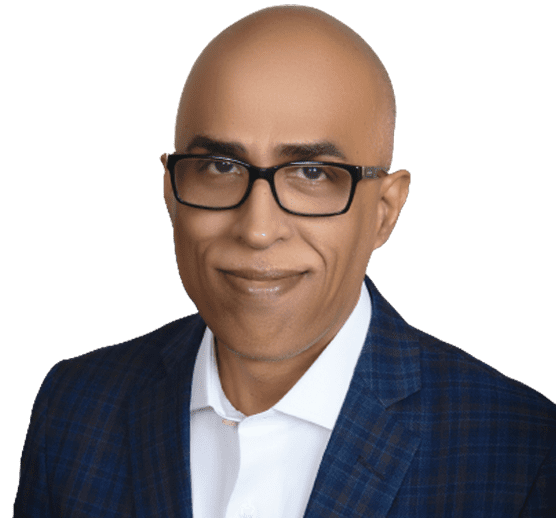
Paddy was the co-author of Healthcare Digital Transformation – How Consumerism, Technology and Pandemic are Accelerating the Future (Taylor & Francis, Aug 2020), along with Edward W. Marx. Paddy was also the author of the best-selling book The Big Unlock – Harnessing Data and Growing Digital Health Businesses in a Value-based Care Era (Archway Publishing, 2017). He was the host of the highly subscribed The Big Unlock podcast on digital transformation in healthcare featuring C-level executives from the healthcare and technology sectors. He was widely published and had a by-lined column in CIO Magazine and other respected industry publications.
Stay informed on the latest in digital health innovation and digital transformation